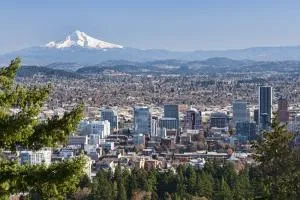Oregon, a state celebrated for its majestic natural beauty ranging from the Pacific coastline to dense forests and towering mountains, harbors a lesser-known treasure: its stunning night skies. Far from city lights, Oregon offers countless ideal locations to immerse yourself in the vast universe and marvel at the ethereal beauty of thousands of twinkling stars. If you are an astronomy enthusiast or simply seeking a unique and memorable travel experience, Oregon will surely not disappoint with its unparalleled stargazing destinations.
Crater Lake National Park: Deep Blue Waters and Endless Starry Skies
Crater Lake National Park, Oregon’s gem, is not only famous for its deep blue lake formed in a collapsed volcano but also one of the best stargazing spots in the United States. With its high elevation, clean air, and extremely low light pollution, Crater Lake provides an expansive and incredibly clear view of the night sky.
Here, you can easily observe the Milky Way stretching across the sky like a river of light, thousands of stars twinkling like diamonds, and even fascinating astronomical phenomena like meteor showers. The park often hosts astronomy programs, helping visitors learn more about the universe and how to identify constellations.
For the most complete stargazing experience at Crater Lake, you should visit in the summer or early autumn when the weather is dry and the skies are clear. Prepare a red flashlight to keep your eyes adjusted to the darkness, binoculars or a telescope if you have them, and don’t forget to bring warm clothes as nighttime temperatures in the high mountains can drop quite low even in summer.

Oregon Outback International Dark Sky Sanctuary: Where Darkness Reigns
If you want to find a truly secluded location and completely escape light pollution, the Oregon Outback International Dark Sky Sanctuary is the perfect choice. Located in the vast and pristine southeastern Oregon, this sanctuary is recognized as one of the darkest night skies in North America.
Spanning over 2.5 million acres, the Oregon Outback offers ample space to immerse yourself in the universe. Here, you can admire the faintest constellations that are difficult to see with the naked eye elsewhere, explore the magnificent beauty of the Milky Way, and enjoy the absolute silence of the night.
The Oregon Outback is not only an ideal destination for astronomy enthusiasts but also a great place for camping, hiking, and exploring the unique beauty of the high desert. Be sure to pack personal supplies, water, and food if you plan to explore this area overnight, and remember to check the weather forecast before you go as desert weather conditions can change rapidly.
Pine Mountain Observatory: A Window to the Universe
Located atop Pine Mountain in the Cascade Mountains, Pine Mountain Observatory is an astronomical research facility of the University of Oregon. However, the observatory also opens to tourists on certain nights of the year, offering a rare opportunity to stargaze through professional telescopes.
With a 32-inch diameter telescope, one of the largest in the Pacific Northwest, Pine Mountain Observatory allows you to observe planets, nebulae, and galaxies in unprecedented magnification and detail. Astronomers at the observatory are also willing to share their knowledge and guide you in exploring the night sky.
To find out about opening schedules and book a visit to Pine Mountain Observatory, you should visit the observatory’s official website or contact them directly for more details. This is a unique stargazing experience that combines tourism and education, suitable for both families and science enthusiasts.
Goldendale Observatory State Park: Explore the Cosmos with a Giant Telescope
Although located in Washington State, Goldendale Observatory State Park is just a short drive from the Oregon border and is a popular stargazing destination for Oregonians. The park features a 24.5-inch reflecting telescope, one of the largest public telescopes in the world, offering an incredibly impressive cosmic observation experience.
Goldendale Observatory State Park is open to the public on weekend evenings, allowing visitors to stargaze through the telescope and participate in astronomy programs. The park also has a large outdoor viewing area where you can freely stargaze with the naked eye or personal binoculars.
The best time to visit Goldendale Observatory is in the summer and autumn, when the skies are clear and the summer and autumn constellations are clearly visible. Check the park’s operating schedule before you go and prepare for a night of fascinating cosmic exploration.
Oregon Beaches: Stargazing by the Pacific Coast
Another unique stargazing experience that Oregon offers is stargazing on the beach. Along Oregon’s hundreds of miles of Pacific coastline, there are many secluded and low light pollution beaches, creating a romantic and ideal setting for admiring the night sky.
Imagine lying on the smooth sand, listening to the gentle sound of waves, and looking up at the starry sky. The Milky Way stretches overhead, bright stars twinkle against the deep black sky, all blending together to create a stunning and unforgettable natural picture.
Some famous beaches in Oregon suitable for stargazing include Cannon Beach, Pacific City, and Oregon Dunes National Recreation Area. You should choose nights with a new moon or crescent moon to minimize moonlight and increase the clarity of the stars. Don’t forget to bring warm blankets, snacks, and hot drinks to fully enjoy a night of stargazing by the beach.
Oregon is not only an attractive tourist destination with its daytime natural beauty but also a paradise for night sky enthusiasts. With many ideal stargazing locations, from high mountain national parks to pristine dark sky sanctuaries and poetic beaches, Oregon promises to offer you unforgettable stargazing experiences and memorable moments of the universe’s magical beauty. Plan your stargazing trip to Oregon today and discover the wonders awaiting in the night sky!